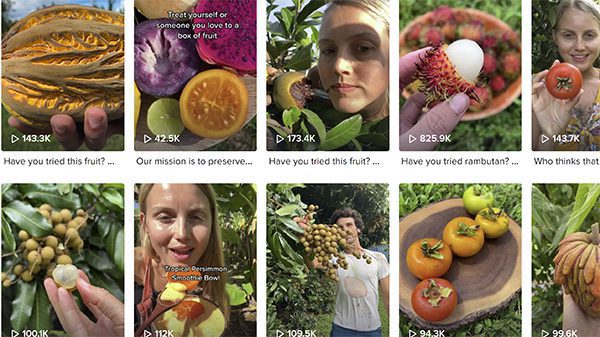Many have observed the resemblance of certain fruits and vegetables to the private parts of human beings, and some have even made use of them along these lines.
A tropical fruit company, Miami Fruit, Miami Fruit is using this as a way of catching clicks on social media.
As Antara Sinha, writing on Bon Appétit, puts it, Miami Fruit: The Uncannily Sexual Fruit Videos Seducing the Internet | Bon Appétit (bonappetit.com), “Miami Fruit has figured out a way to make fruit go viral.”
Sinha writes, “Dusty brown almond-shaped mamey sapote sliced and pried open in the South Florida golden hour to reveal vivid crimson flesh. Neon green awapuhi, or shampoo ginger, shaped like slender pinecones, grasped and squeezed around its base—yes, the way that you’re thinking—until slimy liquid oozes from its flower head.”
The Homeland, FL-based Miami Fruit, which ships boxes of tropical fruit assortments to customers, has attracted 400,000 followers on Instagram and 1.2 million followers on TikTok with its suggestive images. Most are simply closeup shots of fruit, although some resort to the traditional cheesecake: in one video, a busty young woman cuts open a long-necked avocado and eats it in a way that some might consider indecent.
The long-necked avocado is a recurring theme in the site’s postings.
Monstera deliciosa, sometimes found as a houseplant, evokes phallic associations, but “is known as one of the world’s most delicious fruits,” says one video, which shows you how to eat them.
Or consider this useful instructional video on how to eat an abiu. Tag a friend that needs to try this ???? #abiu #Pouteriacaimito #miami… | TikTok
Sapotes, by contrast, suggest more feminine associations.
The business began in 2015, when cofounder Rane Roatta started a banana delivery business on his bicycle. It expanded into a fruit stand selling other items, and when friends asked Roatta and cofounder Estelle Schlegel to send them boxes of fruit, their company was born.
At the same time, the videos go into the fruits’ more gustatory aspects, such as taste, texture, and how to eat them. It’s helpful, because many of these items, though familiar in South America, Asia, and Africa, are almost unknown in the United States.
The novel Miami Fruit videos indicate that (in case you hadn’t noticed) the American sensibility is much less puritanical than it was a generation or two ago.
“Roatta says the videos’ popularity has also not directly translated into sales,” writes Sinha.
“But Miami Fruit is hoping to continue engaging its fruit-loving audience more deeply and ambitiously. ‘We’re, in a way, in a way, influencing the new generation to be excited about healthy food and nature,’ Schlegel says.”



